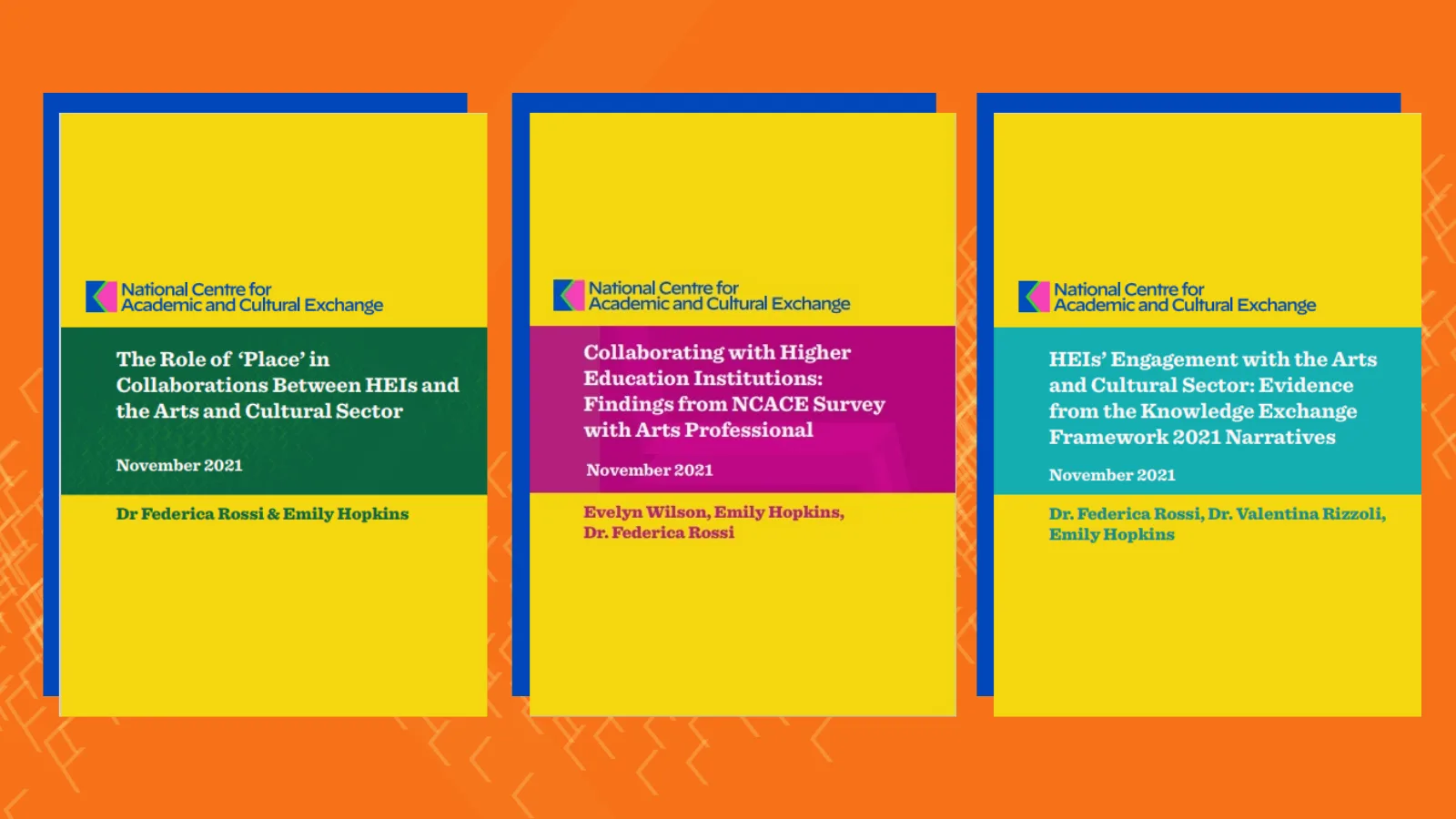
After many months of work behind the scenes, the team and I are thrilled to announce the launch of our NCACE Evidence Repository. Since the inception of the centre, it has been critical that we developed a virtual tool that enables users from across all sectors to access resources on the scale, extent, nature, drivers, and wider impacts of collaborative knowledge exchange between Higher Education and the arts and culture sectors. This Repository was made live in December 2021 and forms a core part of the NCACE Evidence Hub.
We have been undertaking research on cultural collaborations and partnerships for over a year, including the publication of a number of reports on topics from placemaking to KEF2021. Our own work has, of course, been informed and enriched by a whole host of existing research and evidence from various external stakeholders and authors. As part of our NCACE Evidence Hub, we wanted our audiences to also be able to find this information and so we set out to create the NCACE Evidence Repository: to collect and house as much of this high quality evidence as possible. We hope this will act as the go-to resource for information on cultural knowledge exchange.
Our Evidence Repository is a unique and carefully curated resource of materials, and importantly, this had to be accessible and navigable for our cross-sector audiences. During conversations with our partners and collaborators, we found that much of the existing evidence was written from the perspective of academics or universities. To attend to the broad and varied backgrounds of those working on cultural knowledge exchange, we have sourced a variety of resources from both academic and non-academic sources - from peer-reviewed journals and policy documents to blogs, podcasts and toolkits to name just a few. Furthermore, we did not want this information to be available for only a select few: almost all of the resources we have gathered are open-access, to ensure that all users of the Repository can read these without paywalls or passwords acting as obstacles.
As a team, we have spent a lot of time throughout 2021 sourcing these pieces of evidence, but this was also a task that was helped by our wider community of practice - thank you to all of those who have shared evidence with us and played a role in co-creating the contents of this vital tool. Thanks to this collective work, as of December, the Repository housed over 150 open-access evidence sources. This process will carry on, as the Repository is continually updated with the latest emerging evidence - we warmly encourage you to continue sending any resources that you think would be helpful to include in the Repository to info@ncace.ac.uk.
When using the Repository, you will see these resources are curated into eight thematic categories, which each have their own page. These include four key categories:
- General Knowledge Exchange (including pieces which are critical for the broader KE context but not always specifically addressing the role of arts and culture)
- Culture Related Knowledge Exchange (including pieces on cross-disciplinary KE with an arts and cultural focus)
- Knowledge Exchange and Covid-19 (to address the specific challenges faced over the pandemic period)
- Toolkits and Skills for Knowledge Exchange (specifically including resources that provide practical information and how-to’s for collaborative KE work)
The final categories relate to the four core NCACE themes which guide our wider work and mission: Placemaking and Levelling Out, Health and Wellbeing, Technologies for Social Good, Environment and Climate Emergency. Thanks to our talented website developer, you will also see that each category has a filter bar to help narrow down the selection of resources - this may be by the type of resource (e.g. report), the author, or any key words that you may specifically want to find.
The Repository also houses our three new NCACE reports, which are now available to download. The first is our research on how cultural collaborations have been discussed by HEIs through the Knowledge Exchange Framework 2021 narratives:
- HEIs’ Engagement with the Arts and Cultural Sector: Evidence from the Knowledge Exchange Framework 2021 Narratives by Dr Federica Rossi, Dr Valentina Rizzoli and Emily Hopkins
Our two other reports discuss the results of the Arts Professional survey that we launched back in March 2021. This includes an in-depth view of the general findings, and a sister report specifically focusing on the place-based and place-focused responses:
- Collaborating with Higher Education Institutions: Findings from NCACE Survey with Arts Professional by Evelyn Wilson, Emily Hopkins and Dr Federica Rossi
- The Role of ‘Place’ in Collaborations Between HEIs and the Arts and Cultural Sector by Dr Federica Rossi and Emily Hopkins
The NCACE Repository now sits alongside our Evidence Café sessions, policy workshops and research reports to form the wider Evidence Hub. We hope this is a helpful resource for all of those who want to access further information on the scale, nature, impact and histories of cultural knowledge exchange collaborations. You can access the Repository and explore the eight themed evidence categories here.
Finally, to kick off 2022, we are now turning our focus to another aspect of the NCACE Evidence Hub: collecting case studies which we will use as models of good practice in regard to knowledge exchange between HE and cultural partners. We would love to hear from you in order to build this evidence - if you have any examples of collaborative work that you feel would be interesting to share with us, please email info@ncace.ac.uk and we will be in touch. Thank you!
